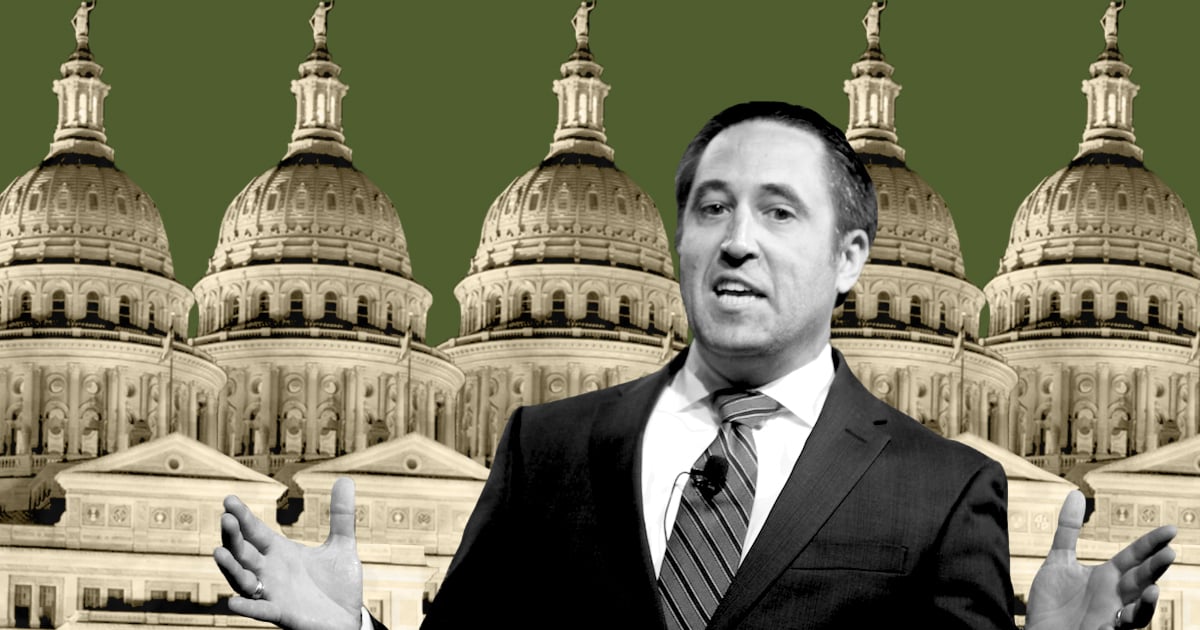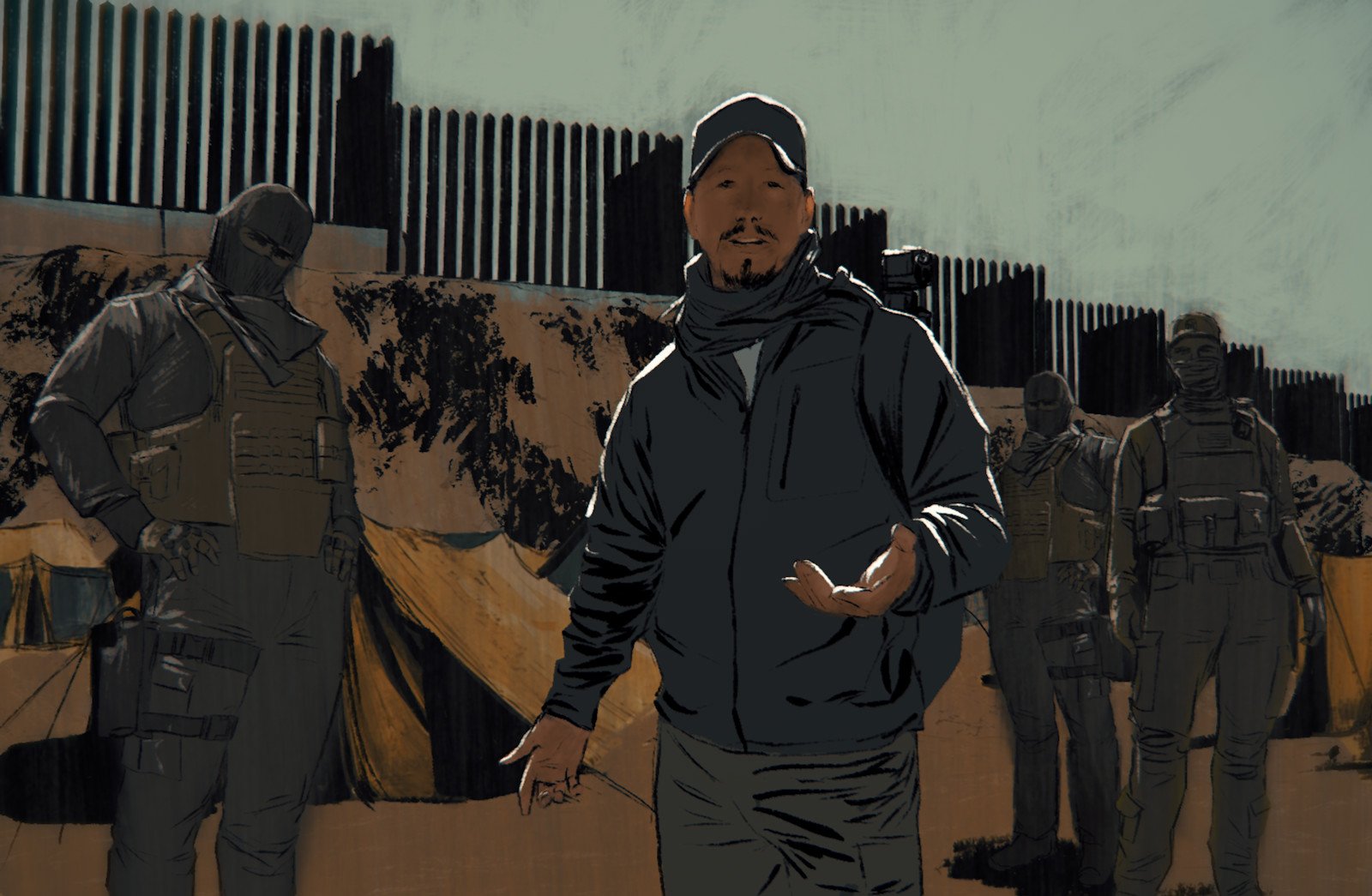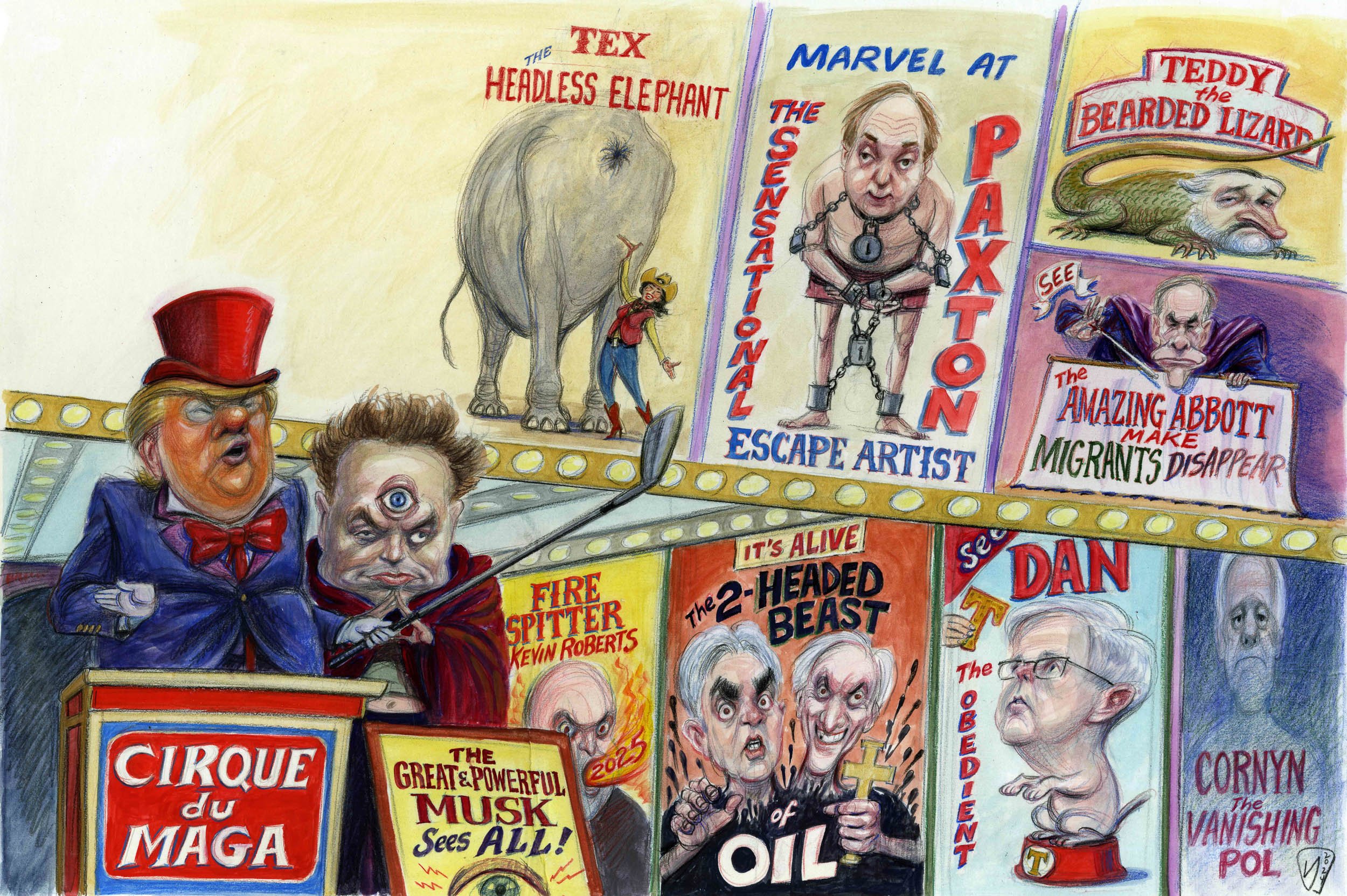Misfortunate Son
Has anyone ever been more fascinating on account of his limitations, rather than his strengths, than George W. Bush has?
The unreflective gut-player has inspired a library of books, a shelf of documentaries, and now an Oliver Stone film. (He has also been fictionalized in Curtis Suttenfeld’s American Wife.) Most of the interest is attributable to the havoc he and his administration have wrought at home and abroad. People want to understand these perilous times. But there is a further fascination with the Decider himself. At first blush, the curiosity he evokes seems purely condescending: “How did that mental and moral midget become the mighty POTUS?”
Does Bush inspire reactions other than straightforward contempt and fury? Now that he’s about to exit the scene, are we still interested in knowing who he is, possibly even feeling sympathy for him? The notion would have been unthinkable four years ago as he rode waves of self-stirred fear and loathing to re-election. He was able then to laugh off the idea that future historians might judge his presidency harshly with the words, “In history we’ll all be dead.”
Four short years later, history has already squashed Bush like a bug. The question remains as to whether he understands how badly he’s damaged four reputations: his own, his family’s, the Republican Party’s, and most importantly, the country’s.
Watching Bush address the current economic crisis, his brow now deeply lined but still curiously unworried, one doubts it. It looks like he doesn’t get it, never got it, and never will. Such titanium-plated ignorance may be the last of his seemingly boundless good luck.
You could make a movie about that guy, the man who is willfully and powerfully clueless to the destruction he’s wrought. That movie might end by showing how carefully he’s sealed himself off from reality and how this isolation, while damaging him beyond repair, does at least allow him to get out of bed in the morning. That movie would be an austere tragedy in the manner of the first two Godfather movies (especially II), in which we see with unusual clarity how thoroughly Michael Corleone’s wielding of power cuts him off from life.
Oliver Stone and writer Stanley Weiser (who also scripted 1987’s Wall Street) take a different approach. Broadly speaking, they have conceived their tragic hero as Fredo Corleone rather than Michael, reimagining Bush as a weak, out-of-his-depth sibling who improbably seizes familial power and, along with it, the destiny that rightly belongs to his brother Jeb.
History is the filmmakers’ guide here. This Fredo-to-the-top scenario is pretty much what really happened. You couldn’t make this stuff up.
The film, which feels unusually restrained for an Oliver Stone production, opens on dual tracks. We see President W. (Josh Brolin) preparing to deliver his infamous Axis of Evil State of the Union address, then jumps back to Yale in 1966, where young Bush (also played by Brolin) and his fellow Delta Kappa pledges cower naked inside barrels while vodka is funneled into their mouths every time they answer a trivia question wrongly. The scene, with its bleached-out lighting, looks like an outtake from Saw, and the fraternity men seem genuinely threatening. You could die during one of these sessions.
In this way, Stone points to a dark future, connecting the dots between fraternity hazing and Bush-authorized torture. (In 1967, Bush defended fraternity “branding” practices involving physical beatings and burning flesh; as president, he dismissed allegations of prisoner abuse by comparison to college hazing.)
Brolin also makes an early show of Bush’s political gifts in this scene: He’s spared the worst of the humiliation because, unlike his fellow pledges, he can rattle off the names of the made men-the frat boys, that is-who want to pour vodka down his gullet until he pukes.
In the following scenes, Bush does most of the pouring himself. We see him in a dark Midland honky-tonk, downing beers, proposing marriage to a good old girl (who doesn’t seem to be modeled on the Rice student to whom Bush actually was engaged), and dancing with her across the bar top, producing a powerful Urban Cowboy flashback in the process. We see him quit an oil-rig job so he can go to town and get a drink. We see him embracing his best friend, Jack Daniels, in a number of social settings, from the barbecue where he meets the lovely but enigmatic Laura (Elizabeth Banks) all the way to his well-lubricated 40th birthday party, after which he decides he’s finally had enough to drink.
Interspersed are other scenes from the 1960s and ’70s that show Bush dealing with the long shadows cast by his parents and younger brother Jeb-the smart one. The future president essentially wails throughout: “Dad always liked you best.”
Brolin, who last year was absolutely convincing as an unlucky, deer-hunting Vietnam vet in No Country for Old Men, here gives us a George W. Bush who can express himself only in verbal clichés and painfully uptight body language. Yet he retains a wounded and pitiable human core-a core that’s been squelched into a Shrub rather than a Bush (as Molly Ivins had it) early in life. There’s a pain in Brolin’s Bush that seems rooted in something deeper than parental disapproval.
(The film doesn’t deal with Bush’s early childhood, but Stone might have squeezed some insight out of the death from leukemia of Bush’s 3-year-old sister, Robin, when he was 7. He hadn’t even known she was sick, and apparently wasn’t allowed to attend her funeral. According to some accounts, his parents played golf the next day, no doubt in an attempt to forestall their grief.)
There’s no need to recount the plot. The film ends before the 2004 election as the world comes to realize there were no weapons of mass destruction in Iraq. Everyone already knows that story, which Stone plays straight.
The film largely stands and falls on the skill with which Stone and his first-rate cast show us what we already know. Richard Dreyfuss’ conniving Dick Cheney is just shy of Strangelovian in the scene showing the case for war being laid out for Bush. Scott Glenn’s Donald Rumsfeld signals his lack of concern for the suffering of U.S. troops by smiling contentedly while digging into a slice of pecan pie. Jeffrey Wright’s Colin Powell doesn’t have quite the gravitas that the original projects-his voice is perhaps a little too soft. The moment when he, the lone voice of reason, capitulates to Cheney and Rummy and signs on to the invasion falls a little flat. (He does later deliver a satisfying “fuck you” to the preening, bullying Cheney.)
Elizabeth Banks’ Laura Bush is a missed opportunity. For all the film suggests about the hard-to-explain chemistry between Bush and his book-loving wife, Stone could have simply edited that story line out. Their relationship is one of the areas where the director can’t resist cheap shots. Bush sits on the crapper, wiping his ass, while discussing world events with his wife. After the WMD revelations, she tries to cheer him up with tickets to Cats.
The two characters and performers at the heart of the story are Brolin as W. and James Cromwell as his father. Bush Sr. isn’t exactly presented as a great man. One of the first times W. earns his father’s approval is when he shows him the Willie Horton ad that W. and Lee Atwater have devised.
Bush Sr. looks almost troubled by the dark forces he’s about to unleash in American politics, but he seems more concerned that the mud he’s about to sling not stick to him personally.
Still, it’s hard not to sympathize with Cromwell’s Bush Sr. as he tries to deal with his black-sheep son. Poppy does refuse to grovel for the evangelical vote. Bush Sr. plays politics as a dirty game, but unlike his son, he has a sense of who he is apart from politics. His son doesn’t. He is an almost completely political animal. According to Stone, it’s this limitation that brings Bush literally crashing to earth.
Stone’s most fanciful idea is that Bush finally does realize he’s in far over his head. He may not feel sorry for wounded soldiers and dead Iraqis, but he’s broken-hearted, not to mention panic-stricken, for himself. Stone imagines a George W. Bush who, behind locked doors or in the middle of a nightmare, realizes he’s lost his father’s respect forever. He’s driven to terrified screams.
Out jogging, trying to lose himself in his own sweat, W. collapses and looks up, dazed, into the penetrating eye of a God who knows his every secret. A God who knew, all along, that there were no WMDs in Iraq.
If only Bush had asked God, instead of Dick Cheney.
Houston writer David Theis is the author of the novel Rio Ganges.


